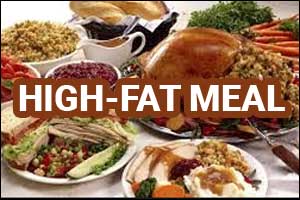- Home
- Editorial
- News
- Practice Guidelines
- Anesthesiology Guidelines
- Cancer Guidelines
- Cardiac Sciences Guidelines
- Critical Care Guidelines
- Dentistry Guidelines
- Dermatology Guidelines
- Diabetes and Endo Guidelines
- Diagnostics Guidelines
- ENT Guidelines
- Featured Practice Guidelines
- Gastroenterology Guidelines
- Geriatrics Guidelines
- Medicine Guidelines
- Nephrology Guidelines
- Neurosciences Guidelines
- Obs and Gynae Guidelines
- Ophthalmology Guidelines
- Orthopaedics Guidelines
- Paediatrics Guidelines
- Psychiatry Guidelines
- Pulmonology Guidelines
- Radiology Guidelines
- Surgery Guidelines
- Urology Guidelines
High-fat diet increases blood pressure in both young females and males

According to new research, a high-fat diet increases blood pressure in both young males and females. The study has been published in the American Journal of Physiology, Heart and Circulatory Physiology.
"You have a lot of people consuming high-fat diets and we don't know enough about what effect it's having on females," says Dr Jennifer C. Sullivan, pharmacologist and physiologist in the Department of Physiology at the Medical College of Georgia at Augusta University.
"Since women are more likely to be obese than men and the association between increases in body weight and blood pressure is stronger in women, we wanted to see if the same response occurs in the female as well," says Sullivan, the study's corresponding author.
The researchers, looked simultaneously at young males and female Dahl salt-sensitive rats, bred to become hypertensive in response to a high-salt diet. More recently, male Dahl rats have been shown to also have significant blood pressure response to a high-fat diet.
They found the usual cardiovascular protection afforded to younger females appeared lost in the face of high-fat consumption. While the young male rats, like male humans, started out with higher blood pressure than their female counterparts, both sexes rapidly experienced a comparable degree of blood pressure increase.
"You put them on high salt, and the males have a bigger increase in pressure; you put them on fat, and males and females have the same increase in pressure," Sullivan said
In both sexes, the high-fat diet also increased inflammation-promoting T cells and decreased the number of inflammation-dampening regulatory T cells, or Tregs, in the aorta, the biggest blood vessel in the body which they studied as an example of what was happening inside blood vessels.
But that's where some sex differences surfaced. Females normally have a higher percentage of Tregs, which help them decrease blood pressure, and while both males and females experienced the decrease, the females maintained that higher percentage regardless of what they consumed. Other studies have shown that in response to things that could increase blood pressure, like high-salt or high-fat intake, females actually increase the percentage of Tregs and maintain good pressure.
In the kidneys, which play a major role in regulating blood pressure, they again found increases in inflammation-promoting T cells in both sexes but a greater increase in males.
Sullivan reiterates that the changes—in males and females alike—were independent of a significant weight gain and occurred in just four weeks.
"To me it really highlights the importance of understanding what you are eating," says Sullivan. "I think we may be underestimating how bad a consistently high-fat diet is for us."
The high-fat diet actually decreased blood levels of triglycerides, a type of fat considered a risk factor for cardiovascular disease, in the males but increased it in females. Cholesterol and blood glucose levels were not really affected in either sex.
Sullivan and her team are now directly addressing the hypothesis that T cells contribute to blood pressure increases on a high-fat diet and whether that diet is directly driving an immune response that drives the blood pressure. She suspects it's the changes to fat cells driving it rather than direct interaction between high-fat food and the immune response.
Evidence supports a sex difference in the impact of a high-fat diet (HFD) on cardiovascular outcomes, with male experimental animals exhibiting greater increases in blood pressure (BP) than female experimental animals. The immune system has been implicated in HFD-induced increases in BP, and there is a sex difference in T-cell activation in hypertension.
For further reference log on to :
DOI: 10.1152/ajpheart.00389.2018

Disclaimer: This site is primarily intended for healthcare professionals. Any content/information on this website does not replace the advice of medical and/or health professionals and should not be construed as medical/diagnostic advice/endorsement or prescription. Use of this site is subject to our terms of use, privacy policy, advertisement policy. © 2020 Minerva Medical Treatment Pvt Ltd